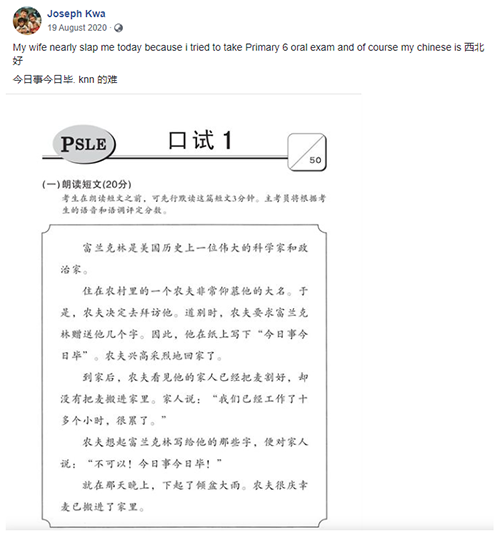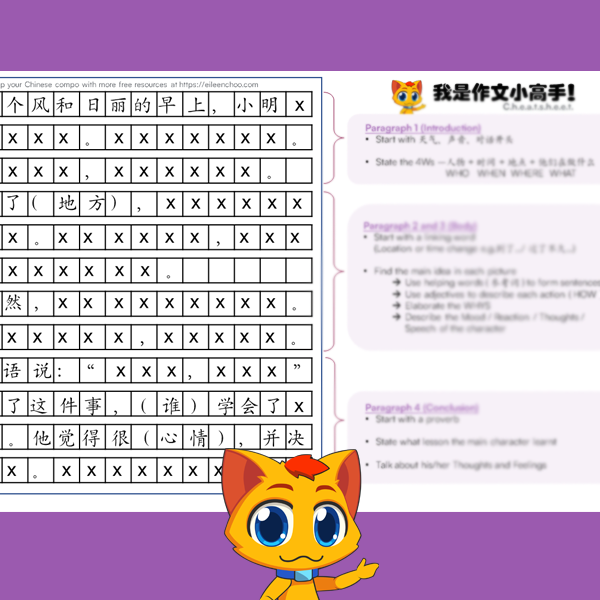
How prepared are you for PSLE Chinese oral?
Try out this primary 6 PSLE Chinese oral practice passage that went viral in 2020 and see how you fare!
I didn’t think that a Chinese oral passage can go viral too when I heard about it (usually it’s the PSLE math questions that gets all the attention…).
In case you are as curious as I am, it turned out that someone posted a Primary 6 Chinese oral passage practice and commented on his “P6 oral exam experience”. Suddenly, people just started to test their Chinese proficiency with it and it became viral.
This is the Chinese oral practice passage:
It seems like the oral practice passage came from one of those primary school Chinese assessment books.

Source: Facebook post
In case you need some help deciphering this Chinese oral passage, here’s the English translation by yours truly:
Franklin is one of America’s greatest scientist and politician in US.
There is this farmer on the farm that admires him a lot.
Hence, he decides to pay him a visit.
Before departing, the farmer asks Franklin to gift him with some words of wisdom.
And so, Franklin wrote on a piece of paper “Don’t put off until tomorrow what you can do today.”
The farmer goes home happily.
Upon reaching home, the farmer saw that his family had harvested their wheat for the day.
However, they did not move the wheat into their house.
His family said, “We’ve been working for more than 10 hours, and we’re very tired.”
The farmer recalled the words that Franklin wrote and echoed what Franklin said to his family.
There was a thunderstorm that night.
The farmer was glad that they have moved the wheat indoors.
What’s the real level of difficultly for this P6 Chinese oral practice passage?
That was the first question that popped up in my mind after reading this whole chunk. (I know…职业病 zhí yè bìng at work!)
Having vetted many oral exam passages in school, I decided to vet this as well. Afterall, I’ve come across certain assessment books that set materials way out of syllabus, so I’m curious to know the actual difficulty level of this Chinese oral passage too.
Let’s analyse this entire Chinese oral passage according to the vocabulary that an average Primary 6 kid should know.
1. Word difficulty of this oral passage
Let’s start with word difficulty. This will affect oral fluency. The more Chinese characters you have problems recognising, the more difficultly you’ll have when reading the whole passage in Chinese.
This is also the first challenge that you’ll need to overcome before even moving on to things like reading the oral passage expressively.
It would not be fair to judge this based on how many Chinese characters and words the average Singaporean adult can recognise. Many would have lost touch over time. So let’s imagine your 12-year-old self. If you were studying in Primary 6, how many Chinese words would you have trouble with?
In terms of recognizing the Chinese characters in this passage, weaker students in Primary 6 will have trouble reading the characters 兰 (lán), 克(kè), 政(zhèng), 仰(yǎng), 暮(mù), 赠(zèng), 毕(bì), 麦(mài) and 割(gē). 9 difficult words.
The usual number of difficult words that we have in school is usually 1 to 2. ^^”
Verdict: Word difficulty – Hard
2. Understanding this Chinese passage
Next, let’s look at whether a Primary 6 can understand this Chinese oral passage. Being able to understand what you read makes it easier for you to chunk words together and read them fluently.
Looking at the Chinese characters, it then becomes very important for a student to be able to tell that the four words 富兰克林 go together because it’s a name of a person, 政治家 is a job and 今日事今日毕 is an idiom.
These words have to be read together to make sense. Otherwise, it’s going to sound really unnatural and affect your pausing.
Verdict: Understanding – Medium
3. Any tricky pronunciation in this Chinese oral passage?
Yes. In fact, 2 of them – 村 and 赠.
These characters are commonly misread by many primary school students. The hanyu pinyin of 村 is cun4 instead of chun4 while the hanyu pinyin for 赠 is zeng4 instead of zheng4.
These differences in pronunciations are really subtle but they affect the accuracy of your pronunciation.
Verdict: Tricky pronunciation – Medium
PSLE Chinese oral practice notes using this oral passage as sample
Since I suggested to use this Primary 6 oral passage as a PSLE Chinese oral practice, I’ve highlighted the important parts to take note of when you are practising
Try reading this again to see if you’ve improved from the first time.
富兰克林是美国历史上一位伟大的科学家和政治家。
住在农村里的一个农夫非常仰暮他的大名。于是,农夫决定去拜访他。
道别时,农夫要求富兰克林赠送他几个字。因此,他在纸上写下“今日事今日毕”。
农夫兴高采烈地回家了。
到家后,农夫看见他的家人已经把麦割好,却没有把麦搬进家里。
家人说: “我们已经工作了十多十小时,很累了。”
农夫想起富兰克林写给他的那些字,便对家人说: “不可以! 今日事今日毕! ”
就在那天晚上,下起了倾盆大雨。
农夫很庆幸麦已搬进了家里。
How many marks would you give yourself out of 20 if this passage appeared in your actual PSLE Primary 6 oral exam?
Tips to score better at PSLE Oral Chinese
As some of you might have already know, the PSLE Oral component takes up 25% of the entire PSLE Chinese exam in Primary 6.
Reading the oral passage well will help you secure the 20 marks easily so that you can focus more effort on the harder video description component (e-oral).
If you are looking for some more PSLE Chinese oral reading passages sample, your best source is to grab a copy of the past year PSLE Chinese booklet from your school bookshop.
Aiming to get a perfect score for oral passage reading? Check out these posts where I share simple tips to help you prepare for your Chinese oral exam and what to do when you are taking the actual examination.






